Love them or hate them, wedding speeches are often one of the most memorable parts of any wedding party. But standing up and speaking in front of a room full of people – no matter how many guests you have – can be seriously intimidating. And if you’ve ever sat through a dry, cliché-riddled wedding speech, where the best man is stumbling from one word to the next, reading off a crumpled scrap bit of paper with zero pizazz or delivery, or the father of the bride just keeps going on and on and on, you’ll know that commanding the room and pulling off an unforgettable toast is no easy feat.
So if you’ve been asked to say a few words about the newlyweds (what an honour!) and you’re currently staring at a blank page, we’ve collated some of our top tips to help you pen a funny, personal and heartwarming speech that’s guaranteed to have your guests crying one moment, and laughing the next.
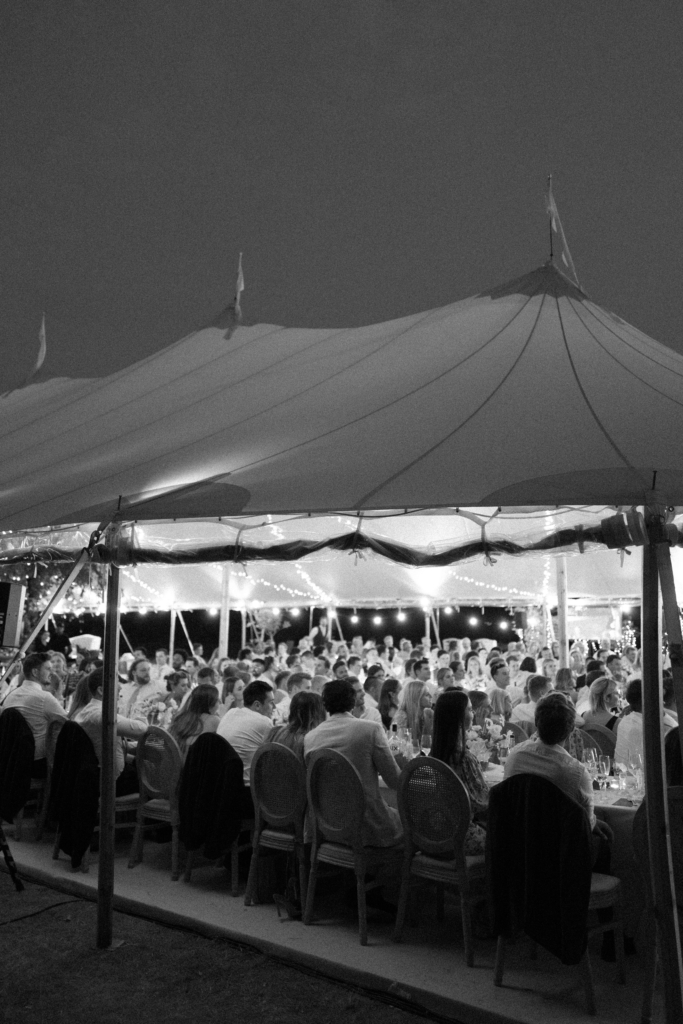
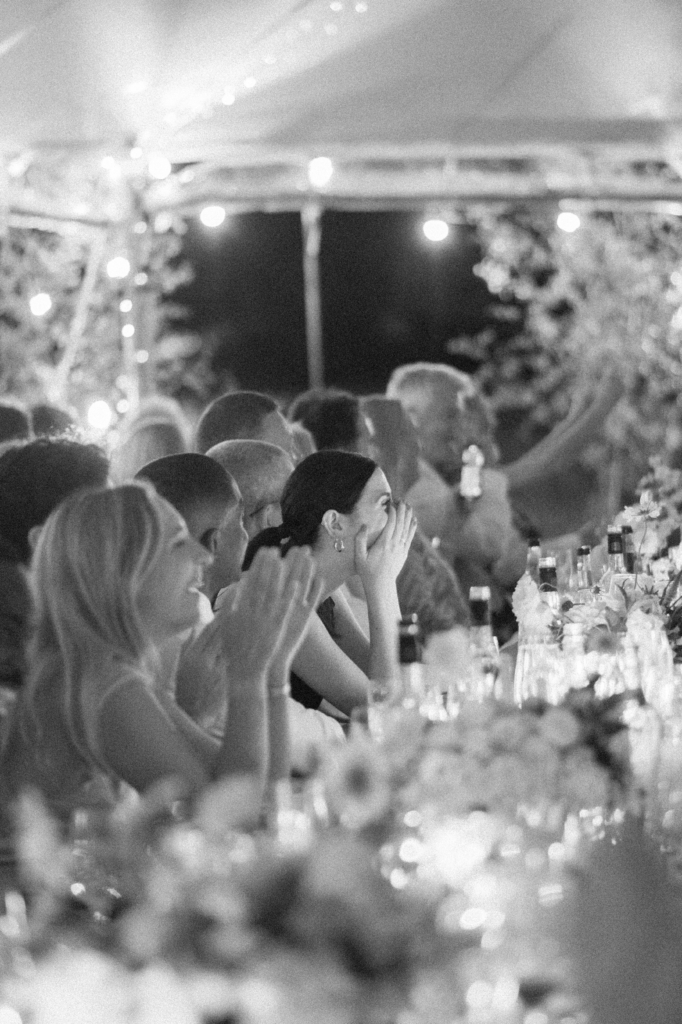
9 Tips On How To Write The Perfect Wedding Speech
1. Give yourself plenty of time
Of course, it depends on how you like to write, but generally speaking, it’s wise to give yourself as long as possible. “You then have time to review it, change things around and take out any bits that maybe shouldn’t be said,” says wedding planner Kerry Poulter.
“Do not leave it to the morning of the wedding!”
Maddie Barton, senior producer for Moriarty Events, suggests thinking about your speech – and collating anecdotes and ideas from family and friends – around three months before the wedding. “I would recommend having the bones of the speech down at least six weeks prior so you can edit and refine,” she says.
“Some people like to give themselves weeks to write and refine the perfect words, whereas others like to write under time pressure as it forces them to focus,” adds wedding planner Alice Wilkes. “Think about how you work best, whether you are a meticulous planner or major procrastinator, and allow yourself the time to do your best work.”
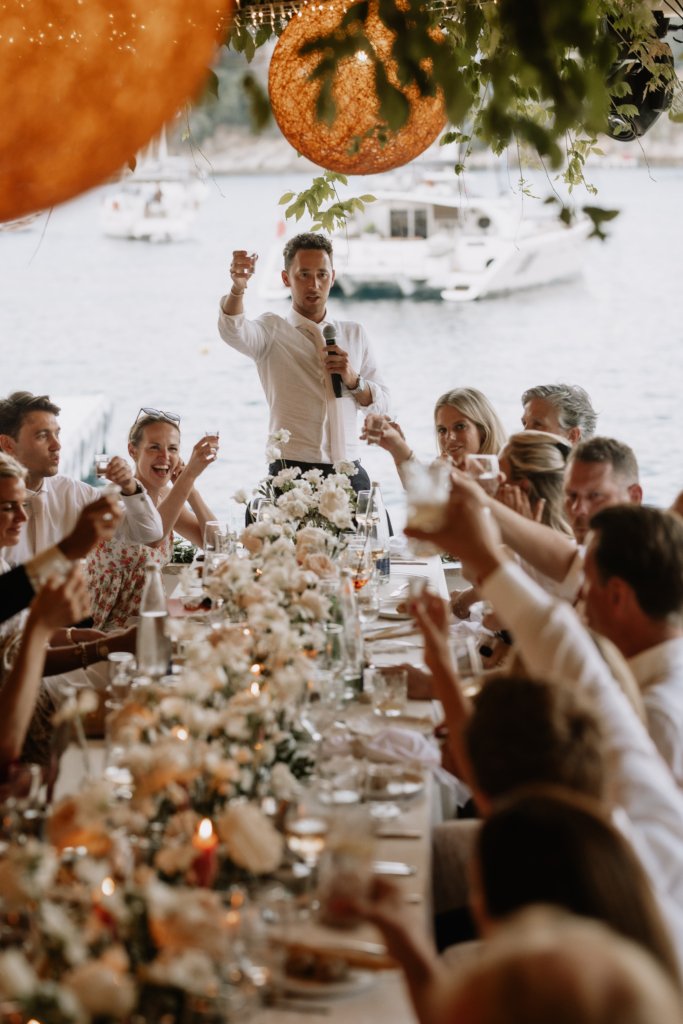
2. Start with a theme or key message that you can come back to
Rather than listing out everything there is to know about the couple, try to identify a theme to focus on. “The best speeches are well rounded with a distinct start, middle and end, with a theme that runs and is referenced throughout, before your big finish,” says Alice. “There are of course some elements you must include, such as thanking key people, however, try to avoid copying a speech you have heard before or found online, as you can be sure that someone else will have heard it too!”
Kerry agrees – cut-and-paste rarely makes a good speech: “Definitely do not google what to say in a wedding speech. It is so obvious who does this and then uses the same one-liners to try and get a laugh. Just start at the beginning, when the friendship for a best man or relationship as a groom started and relevant things that have happened along the way to get you to be doing this speech at the wedding.”
3. Cut the clichés
Avoiding including anything too cliché like ‘they’re the perfect couple’ or starting with a quote no one has heard of. “If you are naturally funny then be funny but if you are not that’s ok too,” says Maddie. “People in the room will know if anything is forced unless you are an Oscar-winning actor. The key is to play to your strengths.”
And if you’re unsure? Just stick to the basics: how you met, what you love about them, and how you’ve seen their lives change for the better since getting together. “One thing to remember is that your speech is not about you so think of the key points of whoever the subject is. The day is about the couple so make sure whoever you are, your wedding speech is predominantly about them,” she adds.
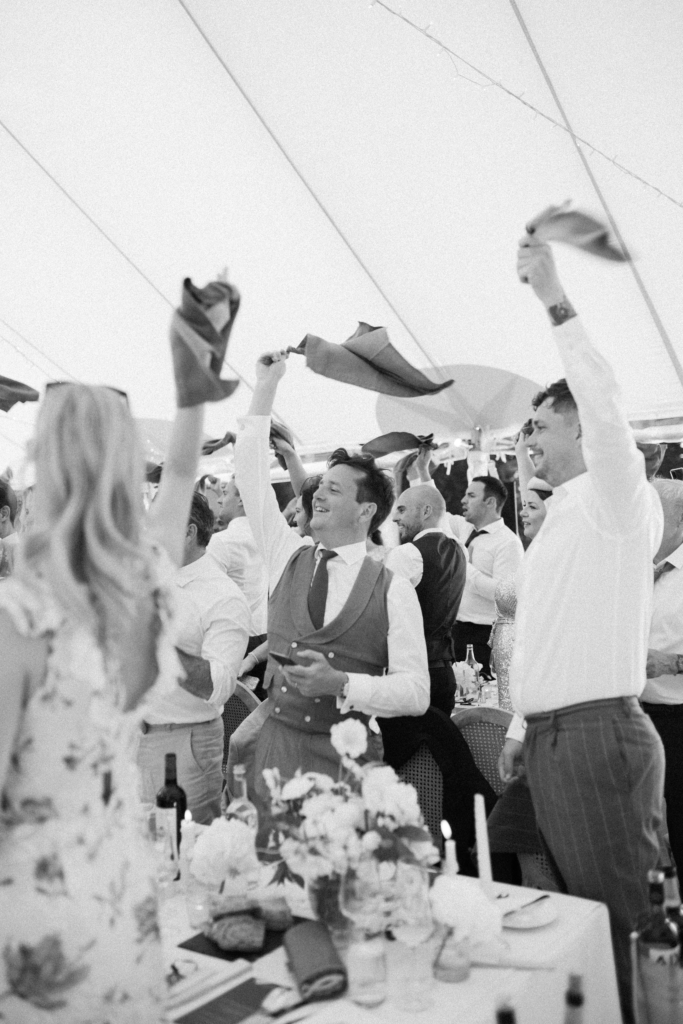
4. Remember to introduce yourself – or get the Master of Ceremonies to
Some people might not actually know who you are, so remember to “introduce yourself but keep it short and to the point,” says Kerry.
“This is where I think a compare or master of ceremonies for the day is a great addition,” adds Maddie. “Pick someone with lots of personality, who can be trusted to remember what they are meant to do and when. They can then take the job of introducing all the speech givers and that takes one worry of their hands.”
5. Avoid ‘in’-jokes
Inside jokes always fall flat – it’s a fact. “We’ve all been to weddings where the best man delivers an apparently hilarious speech, however, no one knows what on earth he’s talking about other than a small group of guys guffawing in the corner,” says Alice. “Also, don’t mention the ex. Please.”
“There is a very fine line between a light joke and a story that really should be kept on the stag do,” adds Maddie. “Just think: would the couple’s parents or grandparents find this amusing? If the answer is even close to a no then I would suggest giving that particular anecdote a miss. Innuendo is your best friend here, the people in the room who are in the know will get what you are saying without having to embarrass the couple completely. It also isn’t the time to do any big revelations.”
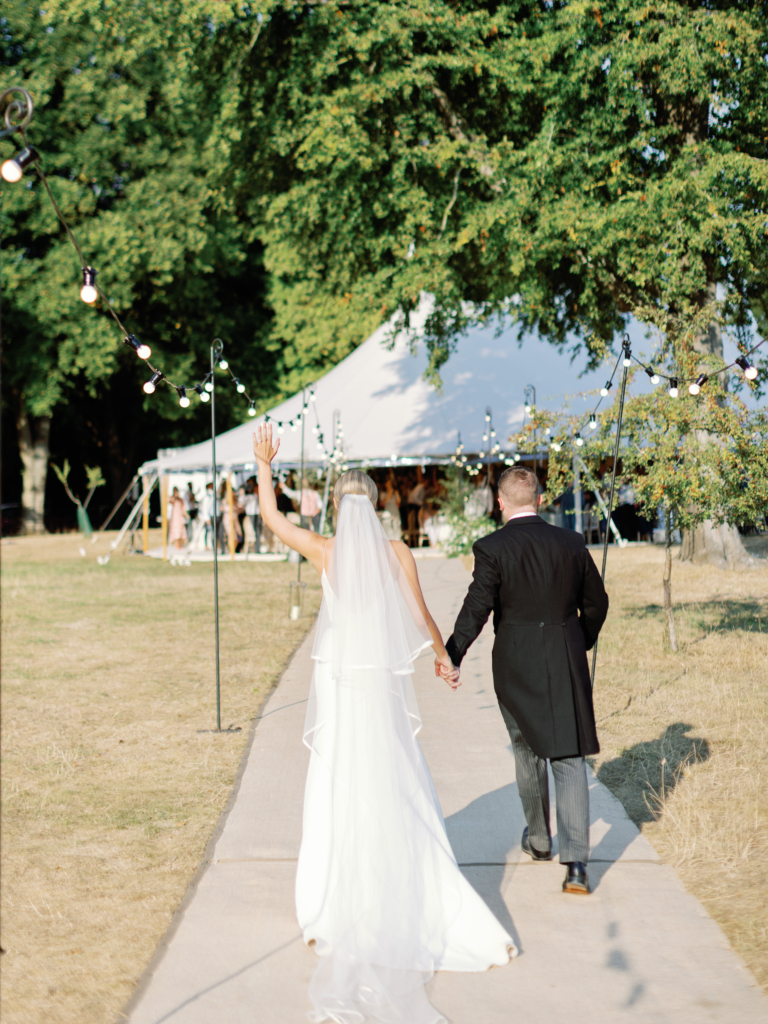
6. Don’t write an essay
Kerry says an individual speech should take 10 minutes at the absolute max and “ideally no longer than 30 mins in total”. Maddie agrees. “When you actually start practising speaking solidly on your own, 10 minutes is a very long time and it is tricky to command a room and keep everyone interested for longer than that.”
Alice suggests slightly shorter: “Speeches should be between five and eight minutes, depending on how many there are. Make sure all speakers know how long the others will be speaking for, roughly. That way speakers will hopefully be more respectful about keeping to their allocated slot.”
7. The best time for speeches is before dinner
“Before dinner is always a good time for speeches,” says Kerry. “Whoever is doing the speeches can then relax and enjoy their meal. If you do want to split them never do it between starter and main, it’s not fair on the caterers if it runs over.” And no one wants their delicious wedding breakfast to be ruined by a speech that goes on a lot longer than expected. “If you put the speeches between the starter and main course and someone waffles on for 20 minutes longer than planned, then the main course could be cold or overcooked,” says Maddie.
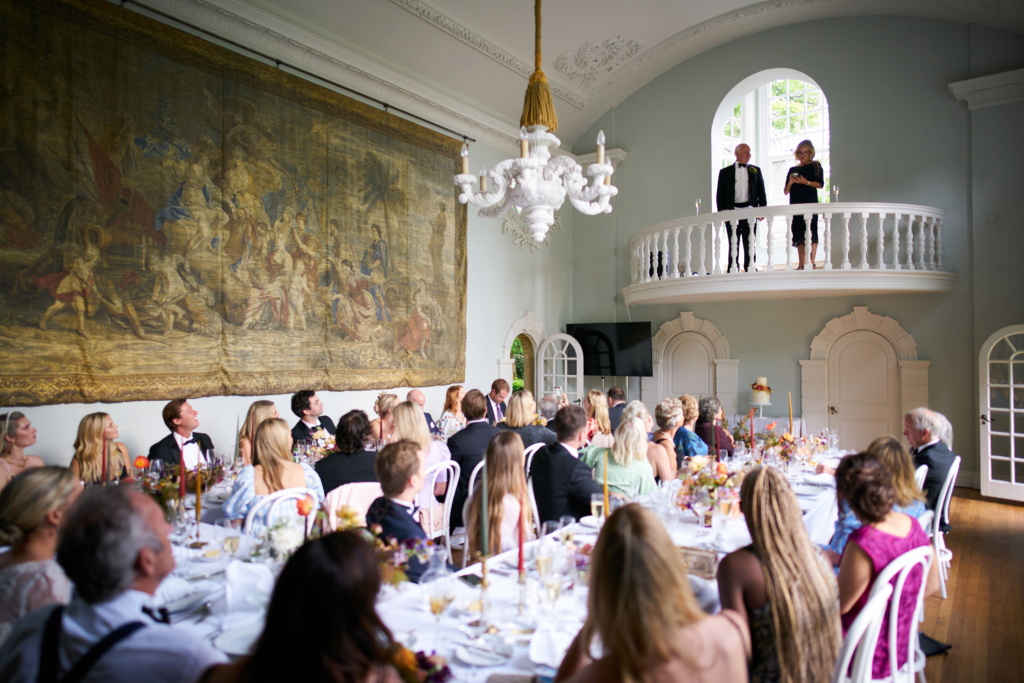
8. Think about how the setting might impact your speech
“A grand setting will naturally lend itself to a more formal arrangement of wedding speeches, whereas a super relaxed venue and vibe will make for a relaxed speaking environment,” says Alice. If you know your speech is going to take place outside, make sure there’s a microphone to hand – there’s nothing worse than when you can’t actually hear what’s being said.
“We did one speech under a huge 400-year-old beech tree outside the ballroom at Cornwell Manor,” says Kerry. “We set up sound and beautiful lighting under it and moved the guests through to listen to the speeches. When they had finished each guest lit their sparklers for the bride and groom to walk back through. It was really special and made the speeches feel like a really important element. The balcony in the ballroom at Cornwell Manor is also a fabulous place to hold the speeches.”
9. Remember your thankyous – but don’t make them a focus
“The father of the bride should thank everyone for coming and then talk about the bride,” says Kerry. “Then maybe about their views or thoughts about the groom when he first came on the scene. Then toast the bride and groom.”
“The Groom should thank the wedding party, bridesmaids, ushers, best man and families, raise a toast to absent friends and family and then talk about and finally toast his beautiful bride,” she says. But remember not to start your speech by thanking everyone – no one wants to sit through a boring list of thank yous.
“The best man can talk about the friendship he has with the groom, any funny stories and maybe about the time the bride and groom met, then give the final toast to the new Mr and Mrs,” advises Kerry.
“Anyone who has contributed to the day without being paid, for example, a friend who has loaned their venue or car, should be thanked,” adds Alice. “You should also mention any important absentees, and anyone who you would have loved to attend but is sadly no longer with us.”
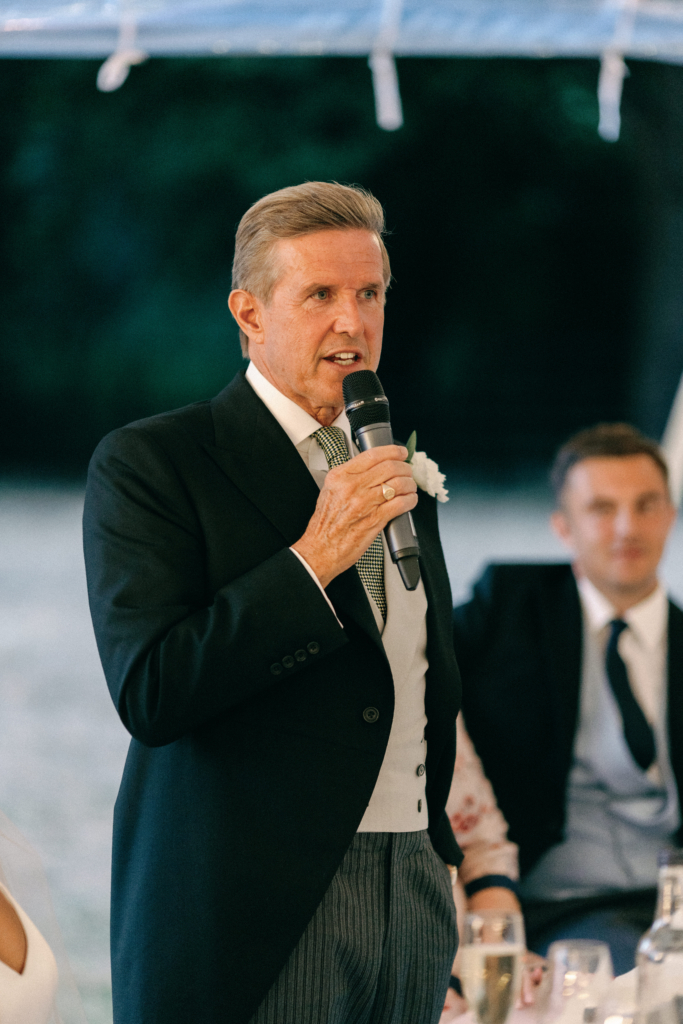
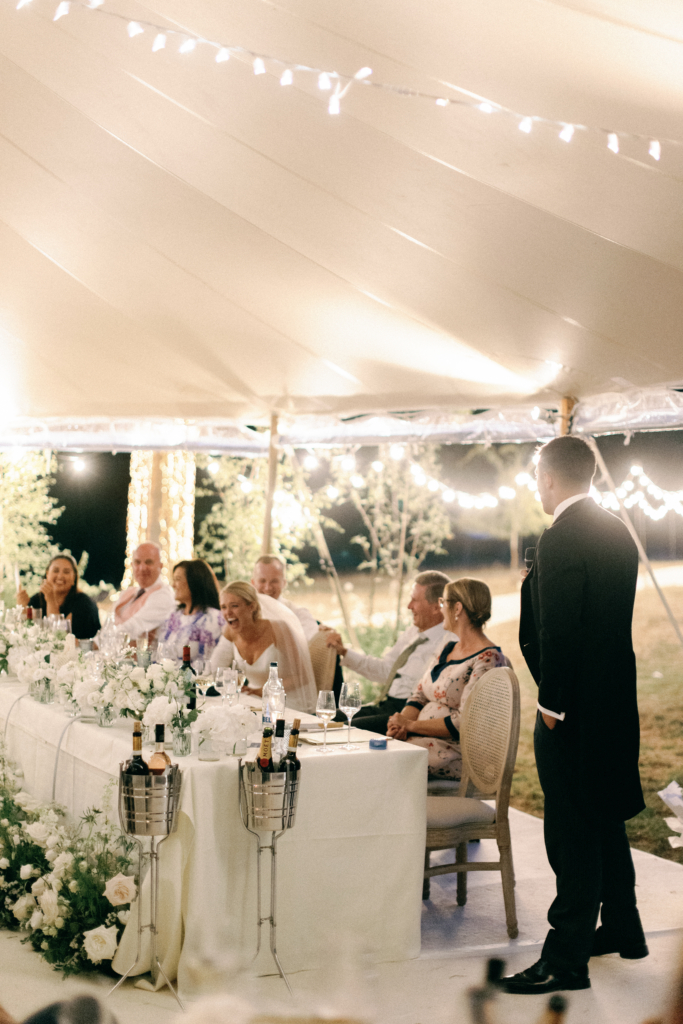
Related Article: Avoiding The Most Common Wedding Planning Mistakes





